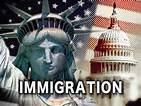Will Congress Fight Obama’s Immigration Power Grab?
Thursday, November 20th, 2014 @ 1:15PM
President Obama is expected to announce, in a prime-time speech tonight, his decision to halt deportation plans (read: amnesty) for approx. five million immigrants who came into this country illegally.
Despite the landslide midterm election results, which were a clear rejection of the president’s policies, Mr. Obama is about to make the most controversial decision of his presidency by way of Executive Order. This action will usurp the Congress and many believe it is unconstitutional.
What follows is the best explanation I have seen on this question of constitutionality. This article appeared in the Wall Street Journal yesterday.
QUOTE:
Congress Will Fight Obama’s Power Grab
The president’s amnesty plan for millions of unlawful
immigrants clearly violates the Constitution.
By Rep. Bob Goodlatte (R-VA), Chairman House Judiciary Committee
President Obama seems poised to announce one of the biggest executive power grabs in American history. He is expected to declare unilaterally that millions of unlawful immigrants can stay in the U.S. without facing the consequences of violating immigration laws. Congress has not agreed on how to reform the immigration system, but the president has decided to ignore the Constitution and alter the law without new statutes. This is a slap in the face of the American people, who voted on Nov. 4 to change the way Washington operates.
The Constitution is clear: It is Congress’s duty to write the nation’s laws and, once they are enacted, it is the president’s responsibility to enforce them. Article II, Section 3, of the Constitution requires the president to “take Care that the Laws be faithfully executed.” This clause compels the president to enforce all constitutionally valid acts of Congress, regardless of his administration’s view of their wisdom. That is a duty, not an option.
Law-enforcement agencies have the power to exercise prosecutorial discretion—deciding whether to enforce the law against particular individuals—but this power must be used judiciously. As Doris Meissner, commissioner of the Immigration and Naturalization Service during the Clinton administration, told her agency in a 2000 memo, such discretion is not “an invitation to violate or ignore the law.”
Mr. Obama’s threatened action amounts to ignoring the law, as an estimated four million to five million unlawful immigrants—close to half of the illegal population—stand to benefit from the decree. That does not constitute faithful execution of the law.
The president justifies his action by saying that he is simply prioritizing immigration enforcement. But there is a difference between setting priorities—say, focusing more resources on special cases—and setting enforcement-free zones for millions of unlawful immigrants. This proclamation will entice countless people around the world to come to the U.S. illegally, just like the government’s Deferred Action for the Childhood Arrivals program that President Obama signed two years ago encouraged tens of thousands of unaccompanied minors and families from Central America to make the dangerous trek to the U.S.
President Obama also claims that these actions are nothing new. Previous presidents from both parties have provided immigration relief to groups of aliens, sometimes abusing prosecutorial discretion and stretching presidential authority. However, far fewer people were affected in those cases. And the actions usually were a response to an emergency in a foreign country—thus they were in keeping with the executive branch’s broad constitutional authority to conduct foreign affairs.
Chinese nationals, for example, were protected from deportation after the Tiananmen Square massacre of 1989. Haitian orphans who were in the process of being adopted by U.S. citizens when the devastating earthquake of 2010 struck were granted humanitarian parole to come to the U.S. Circumstances matter, and without any crisis in a foreign country to justify his actions, President Obama has exceeded his constitutional powers.
The president’s vow to override U.S. immigration laws by executive fiat is not without cost. By acting lawlessly and assuming legislative power, the president is driving full speed toward a constitutional crisis, threatening to unravel the nation’s system of checks and balances. [Emphasis mine.]
Mr. Obama’s planned action also undermines the American people’s trust that the president is committed to enforcing the country’s immigration laws. Americans are deeply concerned about the country’s direction—their statement on Nov. 4 was a firm rejection of the Obama administration’s policies. Rather than listen and change course, the president is doubling down on his failed policies and sending an unmistakable message to the nation: He will do what he wants, when he wants, without regard for the Constitution or what the American people desire… [Emphasis mine.]
… Mr. Obama’s plan to violate the Constitution must be stopped. The Framers wisely gave Congress many tools to guard against the executive branch accumulating too much power. My colleagues in both the House and the Senate will take inventory of the tools afforded to Congress by the Constitution, such as the power of the purse and the authority to write legislation, to stop the president’s unconstitutional actions from being implemented.
The debate in Congress over the past two years has shown that there is a willingness and need to reform our nation’s immigration system. While opinions differ on exactly how to amend the laws, one thing is certain: The president has no authority to make this decision on his own. [Emphasis mine.]
END QUOTE
Posted by AIA Research & Editorial Staff
Categories: Between the Lines


